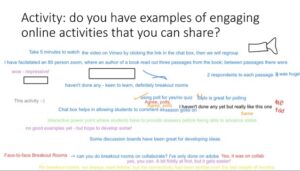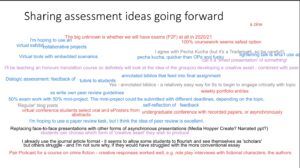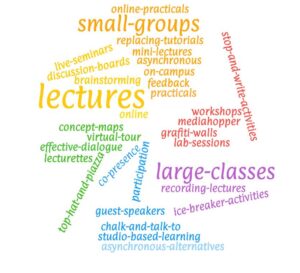Reflections on Supporting Colleagues as They Adapt to Remote and Hybrid Teaching
This post was first published on the Edinburgh Hybrid Teaching Exchange on 25th September 2020.
Along with many IAD colleagues, I’ve been focusing on supporting the transition to online and now hybrid teaching over the last few months and this seems like a good time to pause and reflect on this before the new academic year gets fully underway.
Supporting the move to remote teaching
When we first started home working the focus was on helping colleagues quickly adapt to remote teaching and during April and May I developed and co-delivered (with my colleague Neil Lent) 15 x one-hour sessions using Blackboard Collaborate. These sessions were well-attended and offered a light-touch introduction to online teaching and digital assessment approaches. During the first few sessions, participants were more focused on the functionality of the tool, asking questions about how we set up some of the activities (polling, use of the whiteboard and break-out rooms). As the weeks progressed participants seemed to have developed some confidence in the tool functionality and the focus of the sessions moved on to discussing ideas and concerns about digital teaching and assessment approaches. The screen shots below give a flavour of some of the ideas that were discussed (with thanks to workshop participants for sharing their ideas).

Whiteboard activity where participants shared examples of online activities.

Whiteboard activity where participants shared digital assessment ideas.
Adapting to digital teaching approaches
As we settled into home working routines I was then tasked with developing further support and designed a short two-week Introduction to Online Teaching course which provided a light touch introduction to some of the teaching and assessment approaches to consider when designing and teaching the online parts of hybrid teaching. The course is based on the Learn Foundations template course structure and was designed to complement the An Edinburgh Model for Teaching Online course that I was involved in tutoring during the summer. A self-led, non-taught version of this course is now available.
An Introduction to Online Teaching: useful insights
The team involved in teaching the An Introduction to Online Teaching course are now thinking about how to build on the useful insights and conversations we’ve had with colleagues as they participated in the various iterations of the course during the last few months. I’ve been impressed with participants willingness to share and discuss their ideas as they prepare for hybrid teaching and the image below captures some of the topics covered.

Word cloud highlighting some of the hybrid teaching topics that were discussed during the course.
An important aspect of the course was giving participants the opportunity to share their concerns as well as ideas and to create an environment where they felt comfortable doing this. We included an ice-breaker activity to help begin to build a learning community amongst course participants. There was also a social discussion forum available which was used in a variety of different ways by different cohorts. A recurring theme I noted during each iteration of the course was questions and concerns about technology which ranged from questions about specific tools to much more general concerns about digital confidence levels such as a thread about being terrified of technology. It was great to see how participants supported each other during these discussions sharing their experiences and ideas, as well as their frustrations!
It was also important to include a mixture of activities and a collaborative small group activity was included where participants were asked to develop an outline for an assessment approach that would be suitable for the hybrid context and then share their ideas with the cohort via an elevator pitch. This was an ambitious aspect of the course design given the limited timeline of the course and although many participants did not engage in the group activity, there were some successful groups collaborations.
The final aspect of the course I wanted to reflect on was the inclusion of a live virtual classroom session. The majority of course activities were asynchronous in nature to offer flexibility as participants juggled their engagement with the course and the many other pressing items on their to do lists, providing some insight into some of pressures their students will face as they adjust to learning in the hybrid environment. The virtual classroom was the only live (synchronous) element, and this session was recorded in recognition that not all participants could attend the live session. We invited a guest presenter to lead the virtual classroom session and were lucky to have contributions from a range of experienced online teachers from across the University. It was interesting to observe the different approaches they each took when contributing to the session. Some prepared a presentation and then opened up to questions, others adopted a much less formal approach switching on their video and introducing themselves before inviting colleagues to ask questions. During each of these sessions we had a lively discussion and I think everyone gained insights which will be useful as they explore digital teaching approaches going forward.
This course has offered a useful opportunity to engage in conversations with colleagues across the University as they adapt their teaching for the new academic year. Their willingness to adapt their practices and share ideas has been a real positive aspect of this course.
Acknowledgements
Thanks to my colleagues Rayya Ghul, Lesley Kelly, Neil Lent and Velda McCune who have contributed to the design of the course and to Neil Lent and Fiona Quinlan-Pluck who have been teaching on the various iterations of the course with me over the summer. Thanks also to all the guest presenters for their contributions and to the course participants for engaging and sharing their ideas.


Recent comments